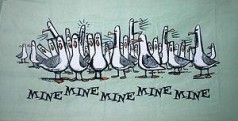I am about to sell my home of 19 years in Juneau, Alaska. I will no longer own the spectacular view that has been my website’s cover picture ever since I started blogging in March 2014. The Gastineau channel, Mt. Roberts, city of Juneau and the cruise ships that grace the harbor 5 months of the year are not my possessions but the picture window, showcasing a breathtaking scene of beauty, has been mine. But I sense an encroaching disquiet coming from a desire to own something of beauty that is threatening to steal my gratitude and perspective.
I am moving back to my 600 square ft. cozy rented apartment in Buffalo, NY and happy to do so. But I’m wistful as I sit in my living room writing this post. As my eyes shift from the computer screen to the scene outside my window the realization that I will no longer have the privilege of feasting my eyes on this particular changing scene of beauty feels surreal.
Years ago I occasionally dreamed I was washing dishes in another home looking outside its window above the sink. In the dream I was continually asking myself, “How did it happen that I am here and not in Juneau, looking out my picture window? How did I give up such beauty?” Waking up was always a happy relief. “Yay, it is all still MINE.”
Anyone feeling sorry for me yet? I hope not. In fact, I may have annoyed some of you. “Spoiled Brat” would not be too far off the mark. Who in this world gets to live in a modest 1964 home with its accompanied price tag and enjoy a multi-million dollar view? Not many middle class folk. Oh yeah, there are many, many desperately under-resourced people of the world who have exquisite views from their ramshackle homes but they are also at risk of devastation brought on by tsunamis, mud slides, hurricanes, earthquakes, floods, malnutrition, disease, exploitation and violence.
A view from a middle class home cannot be separated from social economics. Being economically comfortable allows me the luxury to gush over the view I own.
Now, I am not saying there is anything wrong in being middle class, owning things or lucking out with a fabulous view. Far from it! I want to be genuinely grateful for this undeserved gift of beauty for 19 years and be grateful for my cozy little rented buffalo apartment that I will be moving back to. I should be emotionally on top of this. I have been schooled as a follower of Jesus for several decades so I believe it when the gospels have Jesus saying something to this effect, “Stop worrying about what you are going to own and what ‘views’ you will enjoy because your life is worth so much more than that stuff and your Heavenly Father knows what you need and how to get you through the good stuff without greed, pride, selfishness, entitlement and hoarding and the bad stuff without despair and abandonment.” (Matthew 5:19-34 paraphrased by me).
My p oint of self-criticism is that there is an emotional dysfunction revealed in the words, “mine” and “I need to own it.” It is not the the-in-your-face greed of those seagulls in ‘Finding Nemo’ who perched on the piling keep calling out, “mine, mine, mine, mine.” There is something more seductively deceiving and greedy going on here. Something that can bring on a case of “perspective amnesia” in no time. When I was in the midst of 9 months of treatment for stage 3 breast cancer, my little attic apartment was a sanctuary of peace and hope. View,” shmiew” who cared? Certainly not me. I was not longing for my Juneau home view. I was glad to be getting treatment for a life threatening disease from a major cancer institute only two miles from my apartment while being near my children, grandchildren and a small group of believers who prayed for me and cheered me on, as were the dear friends from Juneau and elsewhere. And less I forget, my husband was with me and I mean, really with me! I was enjoying a view on love and some heavenly treasures. Matthew 6:19-21 bears quoting: “Do not store for yourselves treasures on earth, where moths and vermin destroy, and where thieves break in and steal. But store up for yourselves treasures in heaven, where moths and vermin do not destroy, and where thieves do not break in and steal. For where your treasure is, there your heart will be also.”
oint of self-criticism is that there is an emotional dysfunction revealed in the words, “mine” and “I need to own it.” It is not the the-in-your-face greed of those seagulls in ‘Finding Nemo’ who perched on the piling keep calling out, “mine, mine, mine, mine.” There is something more seductively deceiving and greedy going on here. Something that can bring on a case of “perspective amnesia” in no time. When I was in the midst of 9 months of treatment for stage 3 breast cancer, my little attic apartment was a sanctuary of peace and hope. View,” shmiew” who cared? Certainly not me. I was not longing for my Juneau home view. I was glad to be getting treatment for a life threatening disease from a major cancer institute only two miles from my apartment while being near my children, grandchildren and a small group of believers who prayed for me and cheered me on, as were the dear friends from Juneau and elsewhere. And less I forget, my husband was with me and I mean, really with me! I was enjoying a view on love and some heavenly treasures. Matthew 6:19-21 bears quoting: “Do not store for yourselves treasures on earth, where moths and vermin destroy, and where thieves break in and steal. But store up for yourselves treasures in heaven, where moths and vermin do not destroy, and where thieves do not break in and steal. For where your treasure is, there your heart will be also.”
Six months later and two good post cancer treatment checkups are “ clouding “the view on love and “clearing” the view from my Juneau home with more magnificence and enticement than I have ever remembered and even more so now that I am selling it. The soon “not to be my view” is taunting me with regret, sadness and loss. “Who am I if I don’t own this?” “What will make me feel special?” “How will out of town guests be drawn to visit if the vacation package does not include this place?” This is stupid thinking. As I write these thoughts down they get stupider by the second. (Here is a therapy tip: When you write down disquieting thoughts their significance is opened up to a debate. The false reasoning is exposed. You, then make sure you win the debate with more reasonable thoughts).
Here is a useful verse to reflect on: Psalm 39:4 “Show me, Lord, my life’s end and the number of my days; let me know how fleeting my life is.” Happy verse? Probably not. Liberating one? Most definitely. Life being fleeting doesn’t conjure up a fleet of possessions meeting me at my glorious eternal home. So, meanwhile, it will be best to keep a view of love in perspective. And with a detached gratefulness say goodbye to a view from a home I owned and enjoyed for 19 fleeting years.
